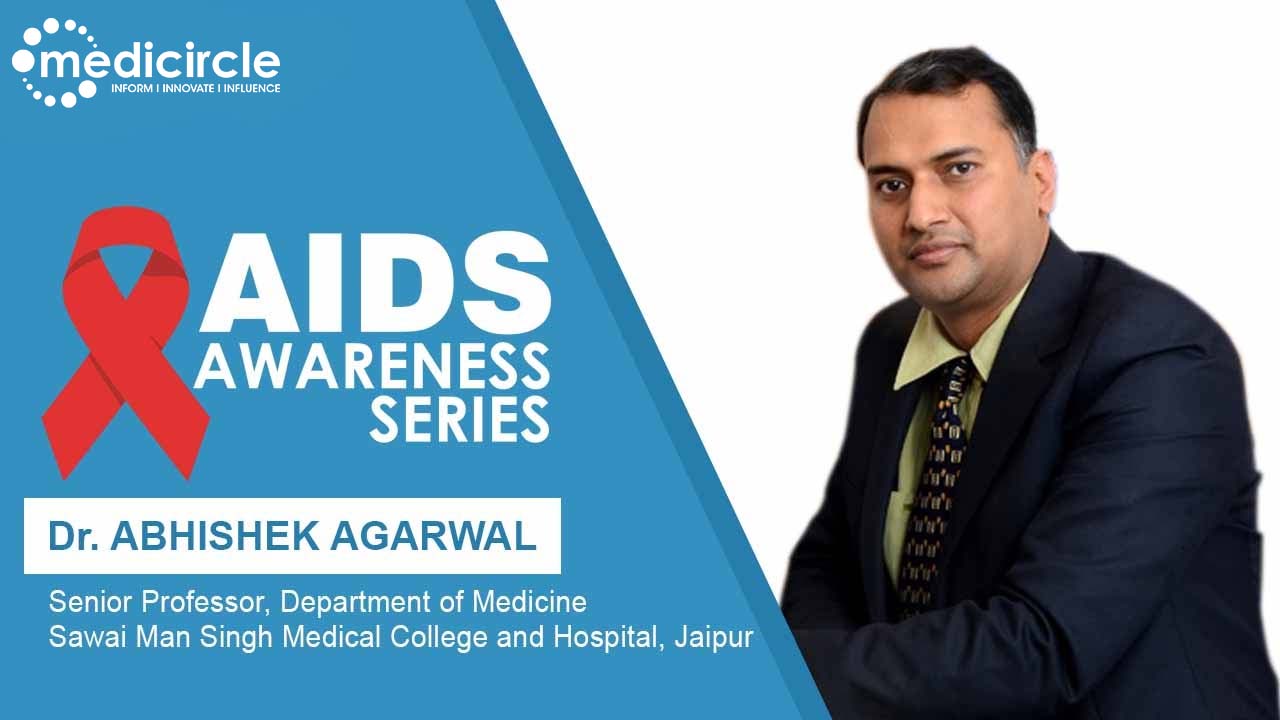We at Medicircle are constantly working on bringing to our audience all the trending health-related topics. It is our primary objective to Bring to your attention news and views you need to be aware of to lead a healthy disease-free life. To help us in this regard we’d be joined by eminent and expert top doctors from across the country. Today in Doctor’s Speak we are going to talk about the problem of prostate cancer and ways to help you deal with it.
Dr. Abhishek Agarwal is a respected Professor with SMS Medical College, Jaipur, and specialist in Diabetes management and HIV Care. He stepped into medical practice in 2003 after successfully completing his MBBS and MD training and since then enjoys a plethora of professional experience. Dr. Agarwal supplemented his medical training with Fellowship in Clinical Management of HIV.
Occurrence of AIDS symptoms
Dr. Abhishek Agarwal says, “AIDS is divided into two major syndromes-
Acute HIV syndrome - this is an initial reaction to HIV just like viral infection causing fever, rash, and swelling of lymph nodes. This usually subsides in 4 -5 days.
Chronic HIV syndrome- Most often when the acute symptoms are ignored, it causes Chronic HIV syndrome. Usually, we diagnose it in this stage and the patient can remain asymptomatic for 6 - 8 years. The CD4 count is very important. It helps in knowing the immunity levels. HIV cells affect the CD4 count which dips below 200 may cause opportunistic infections in the body. This causes slower immunity and may reach the final stage causing AIDS which shows the following symptoms-
Diarrhea Weight loss Rashes Infection Fever Tb infection Viral infection Cancer
Transmission and spread of AIDS
Dr. Abhishek Agarwal informs, “The transmission of AIDS is through 4 routes-
Blood transfusion Sexual transmission is big concern in India Injectables eg IV drugs abusers Maternal transmission through placenta Body Fluid transmission.”
PEP and PREP Treatment for AIDS
Dr. Abhishek Agarwal states, “Prevention is better than cure and if you know the transmission of AIDS, avoid the above 4 causes. Do not involve in multiple sexual relationships. If you are exposed to sexual transmission, then consult the doctor immediately. There are ART centers across the country. There are preventive medicines that can be taken in case of exposure to the transmission of the HIV virus. Diagnostic tests are done to confirm various diseases and HIV. If you are at high risk, HIV occurrence can be halted in the body. This is called Post Exposure Prophylaxis (PEP) which should be started within 72 hours of exposure to the HIV virus. If you take medicine in 36 hours, there are good chances of avoiding HIV.
Consult your doctor before taking PEP treatment
The other treatment is Pre-Exposure Prophylaxis (PREP) is for those who are exposed to HIV transmission and high risk. Consult your doctor before taking PREP treatment. PREP helps in controlling the infection.”
Living with HIV
Dr. Abhishek Agarwal emphasizes, “In the 1980s, patients used to take 30 - 40 tablets per day. There were many side effects of these tablets. There are good medicines available now where the HIV patient has to take 1 -2 medicines per day. They lead a normal life with medicines. HIV is a chronic disease that is manageable like diabetes. The lifespan of HIV medicines can be improved with these effective medicines. Timely medicines need special attention. Stopping medicine abruptly or irregular medications can cause the recurrence of HIV. “
Pregnancy and HIV
Dr. Abhishek Agarwal states, “Placenta can cause the spread of HIV from mother to the unborn baby. Pregnant mothers should be checked for HIV and accordingly, if they are HIV positive, ART treatment should be started. Timely treatment during pregnancy is a must. Late diagnosis during pregnancy may require treatment for mother and child both during pregnancy as well as after delivery.”
(Edited by Dr.Rati Parwani)

 Dr. Abhishek Agarwal gives insights about HIV treatment at the right time. He informs that one should not ignore HIV at an early stage and take appropriate treatment with their doctor. He also educated people with PEP and PREP treatment for HIV.
Dr. Abhishek Agarwal gives insights about HIV treatment at the right time. He informs that one should not ignore HIV at an early stage and take appropriate treatment with their doctor. He also educated people with PEP and PREP treatment for HIV.









.jpeg)







.jpeg)

.jpg)










